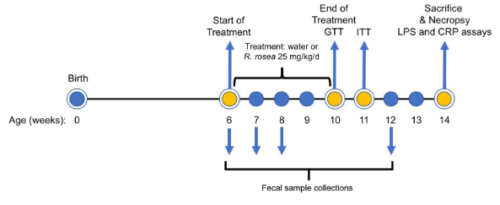薬物療法に代わる植物エキスとして期待される Botanical extract shows promise as an alternative to drug therapy
2022-08-15 カリフォルニア大学校アーバイン校(UCI)
この研究では、ヒトの2型糖尿病モデルマウスにおいて、ロディオラ・ロゼアが空腹時血糖値を下げ、インスリン注射に対する反応を改善し、消化管内の細菌組成を調節し、炎症のバイオマーカーを減少させることが明らかにされました。
<関連情報>
- https://news.uci.edu/2022/08/15/uci-led-study-shows-rhodiola-rosea-root-might-be-beneficial-for-managing-type-2-diabetes/
- https://www.nature.com/articles/s41598-022-14241-7.epdf
レプチン受容体ノックアウトマウスにおける糖尿病バイオマーカー、炎症、マイクロバイオータに対するRhodiola roseaの影響 The impact of Rhodiola rosea on biomarkers of diabetes, inflammation, and microbiota in a leptin receptor‑knockout mouse model
Mahtab Jafari, Jasmin Grace Juanson Arabit, Robert Courville, Dara Kiani, John M. Chaston, Cindy Duy Nguyen, Nilamani Jena, Zhong‑Ying Liu, Prasanthi Tata4 & Richard A. Van Etten4
Scientific Reports Published:22 June 2022
DOI:https://doi.org/10.1038/s41598-022-14241-7

Type 2 diabetes is the most prevalent endocrine disease in the world, and recently the gut microbiotahave become a potential target for its management. Recent studies have illustrated that this diseasemay predispose individuals to certain microbiome compositions, and treatments like metformin havebeen shown to change gut microbiota and their associated metabolic pathways. However, giventhe limitations and side effects associated with pharmaceuticals currently being used for therapyof diabetes, there is a significant need for alternative treatments. In this study, we investigatedthe effects of a root extract from Rhodiola rosea in a Leptin receptor knockout (db/db) mousemodel of type 2 diabetes. Our previous work showed that Rhodiola rosea had anti‑inflammatoryand gut microbiome‑modulating properties, while extending lifespan in several animal models.In this study, treatment with Rhodiola rosea improved fasting blood glucose levels, altered theresponse to exogenous insulin, and decreased circulating lipopolysaccharide and hepatic C‑reactiveprotein transcript levels. We hypothesize that these changes may in part reflect the modulationof the microbiota, resulting in improved gut barrier integrity and decreasing the translocation ofinflammatory biomolecules into the bloodstream. These findings indicate that Rhodiola rosea is anattractive candidate for further research in the management of type 2 diabetes.
Type 2 diabetes (T2D) is a metabolic disease that currently ranks as one of the largest concerns of global publichealth, affecting an estimated 476 million people worldwide . With both genetic and environmental factors con-tributing to this complex disease, diabetes is a leading cause of mortality in many countries and globally impactslife expectancy in both developed and developing nations. One of the hallmarks of the disease is hyperglycemiaresulting from defects in insulin secretion, insulin action, or both . Of the three forms of clinical diabetes, thevast majority (about 90%) of patients have type 2 diabetes (T2D), which is characterized by insulin resistance 3 .Whereas there are many environmental and behavioral factors that modulate genetic susceptibility to this formof diabetes, the prevalence of T2D has risen steadily in recent decades. Due to rising health costs associatedwith the increasing incidence and prevalence of diabetes worldwide, identifying and evaluating safe and cost-effective therapeutic interventions in the management of T2D is of increasing importance. Current treatmentalgorithms for T2D include lifestyle changes, as well as oral and parenteral drugs. However, many currenttreatments have significant limitations or side effects that can impact this large patient population. Althoughmetformin is first-line treatment for T2D, it has side effects including nausea and diarrhea and is contraindicatedin patients predisposed to lactic acidosis . Insulin secretagogues such as sulfonylureas and meglitinides tendto lose their efficacy over time due to beta cell failure, while alpha-glucosidase inhibitors, thiazolidinediones,


